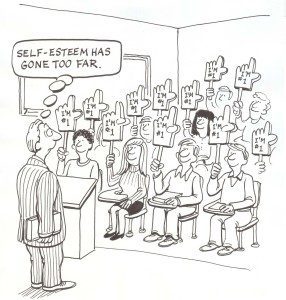How many times have you said to yourself “I’d feel better/ have better relationships/ be thinner/ be happier/not be depressed/ have more friends if I didn’t have low self-esteem’.
We make self-esteem responsible for a LOT of things. And in some ways it is. And in some ways it’s not. Bullies tend to score very high on self-esteem scales. They feel so good about themselves that they see others as inferior. So maybe it’s not all good.
 But for those of us with self-esteem dipping to the lower end of the scale, aiming for higher self-esteem sounds like a pretty good thing.
But for those of us with self-esteem dipping to the lower end of the scale, aiming for higher self-esteem sounds like a pretty good thing.
There’s a theory called Consistency Theory that places self-esteem as one of the four things necessary for mental health. Research says that low self-esteem is associated with all types of personal difficulties like depression, anxiety, less satisfying and stable relationships, poorer performance, and less likelihood of success.
So the answer seems simple: increase your self-esteem.
Sounds easy right?
Wrong. Low self-esteem is incredibly resistant to change. No matter how many times you stand in front of the mirror and tell yourself how fabulous you are if you don’t believe it in the first place it will have little effect.
What we can do is develop more self-compassion. It’s easier to remember that we don’t have to be perfect with self-compassion. It’s easier to remember that there is someone somewhere feeling the same way we do with self-compassion. And it’s easier to be kind and gentle with ourselves when we feel self-compassion.
According to Kristin Neff, developing self-compassion is a 3-Step process: Being kind to ourselves, Reminding ourselves that we’re all human and experience the same difficulties at times, and using Mindfulness to detach from our suffering.
Sounds a bit easier than repeating empty affirmations.
So if you suffer from low self-esteem, try reminding yourself that you’re not alone. Try switching off the inner critic and turning on the inner kind and gentle you. And if you’re feeling pretty ordinary after a good dose of telling yourself how awful/disgusting/what a failure you are after eating too much/ saying the wrong thing/ being too anxious/ being depressed for too long then try to step back and be the observer of your experience. Observe yourself beating yourself up. Observe how wounding it is but also how automatic the criticism is. And observe your feelings in a kind and patient way.
If you need more detail in how to do this either come see me or read Kristin Neff’s book: Self-Compassion: Stop Beating Yourself Up & Leave Insecurity Behind.
